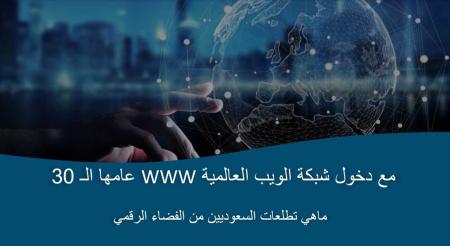To mark the 30th anniversary of the World Wide Web, over 1000 survey respondents from across KSA shared what the Web has made possible for them today, and what they hope it will make possible for future generations.
Whilst the web has delivered many ‘firsts’, from the first website (info.cern.ch – 1990) and the first online banking (Stanford Federal Credit Union -1994), to the first Internet connection in space (Cisco – 2010), people’s ambitions for the Internet’s future overwhelmingly highlight what it can make possible for society.
Enabling ‘better access to education’ tops the list of respondents’ aspirations for the future of the Internet (68 percent), followed by ‘better access to healthcare (59 percent).
Based on a survey of respondents across the Kingdom, the findings showcase the enormous impact that the World Wide Web, as the largest application on the Internet, has had in connecting people and information, over the last 30 years.
Key findings:
- The last 30 years: The number one thing the Internet has made possible for people in KSA is to ‘learn new skills (68 percent), followed by ‘keep in touch with family and friends’ (66 percent) and ‘stay up-to-date and informed’ (63 percent).
Respondents selected the entertainment and education sectors (38 percent each) as the primary beneficiaries of technological advances to-date, followed by the healthcare industry (30 percent).
According to the survey, the Internet is 11 percent more likely to have affected the way in which the over 55s work (58 percent) in comparison with 16-24-year olds (47 percent).
- The next 30 years: Most respondents in KSA would like the Internet to deliver ‘better access to education’ (68 percent), followed by better access to healthcare (59 percent).
When asked which industries will benefit most from technological advancements, the top choice was ‘education (38 percent) followed by ‘healthcare (31 percent).
- Most popular impact: ‘) The entertainment and education sectors (38 percent) percent) are seen as the top two areas in which the web has benefited society to-date, followed by the healthcare industry (30 percent)
The age group most thankful to the Internet for creating new ways of working was the over 55s (35 percent), compared to 21 percent of 16-24-year olds, born into the Digital Age.
- We can’t live without it: A significant portion of the nation’s people (39 percent) can’t imagine being able to function in their jobs without the Internet. A further 41 percent of the Kingdom’s over 55s believe that people born before the Internet have a better appreciation for its benefits.
“We live in a hyper-connected world. By 2022, we are going to see more traffic crossing global networks than in the entire history of the Internet combined. This traffic comes from all of us, and increasingly, our machines. The survey shows the impact that the World Wide Web and the Internet has had on our lives, and what people expect for the future. To realize that potential, organisations – be it in healthcare, education, or any other industry – must be able to understand the power of connections and securely extract value from them. In addition, they need to manage the complexity that comes with the explosion of connecting people, places, ideas and things across a network,” said Salman Faqeeh, Managing Director, Saudi Arabia, Cisco.
To mark the 30th anniversary of the Web, Cisco has curated a collection of 30 ‘world firsts’ made possible by this incredible technology. Read more about this here.
Methodology
This research for Cisco was carried out online by Opinion Matters between 01/03/2019 and 06/03/2019 amongst a panel resulting in 1,003 adult respondents (requiring a minimum of 250 respondents aged 16-24 & 55+) across the Kingdom. All research conducted adheres to the MRS Codes of Conduct (2010) in the UK and ICC/ESOMAR World Research Guidelines. Opinion Matters is registered with the Information Commissioner’s Office and is fully compliant with the Data Protection Act (1998).




